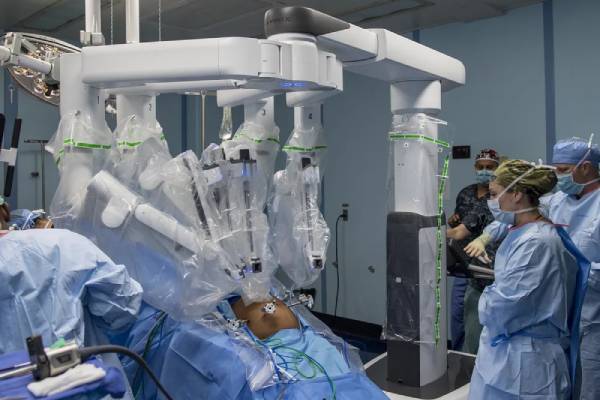Robotic surgeon in Hyderabad
Robotic surgery has become most popular in cancer treatment offering many benefits for both surgeons and patients.Dr. M.S.S Keerthi is the best robotic onco surgeon in Hyderabad and has performed more than 3000+ cancer patients using robotic surgery. After completing her MCh (surgical oncology) from Cancer Institute (WIA), Adyar, Chennai, she currently practices in Tulasi Hospital, and Evoke Clinic at Securandarbad, Telangana, and holds the position of a Sr. Consultant Surgical Oncologist and laparoscopic and robotic Surgeon.

With 15+ years of experience in cancer surgeries, Dr. M.S.S Keerthi is renowned as the best robotic surgeon in Hyderabad, who performs Minimal Access Surgery i.e. Laparoscopic Surgery and Robotic Surgery to offer her patients a smooth and pain-free recovery from Cancer.
What is Robotic Surgery ?
Robotic surgery, also known as robot-assisted surgery, is a modern medical technique that combines the precision of robotics with the expertise of a skilled surgeon to perform minimally invasive surgical procedures. This technology is used to enhance the surgeon’s capabilities and offer several benefits to both patients and healthcare providers.
Types of Robotic Cancer Surgery
According to Dr. M.S.S. Keerthi a Surgical oncologist in Hyderabad , explains that the robotic cancer surgery involves the use of improved robotic systems to help surgeons in performing various cancer- related procedures. These systems offer lesser perfection, dexterity, and control compared to traditional surgical styles. Here are some common manners of robotic cancer surgery
- Robotic Prostatectomy: This is a minimally invasive surgical procedure used to remove the prostate gland in cases of prostate cancer. The da Vinci Surgical System is generally used for this procedure.
- Robotic Hysterectomy: This procedure involves the removal of the uterus and maybe other reproductive organs in cases of uterine or cervical cancer. It offers advantages similar to reduced pain, blood loss, and shorter recovery times compared to traditional open surgery.
- Robotic Colorectal Surgery: Robotic- assisted surgery can be used for various colorectal procedures, including resections of the colon or rectum to treat colorectal cancer. It allows for lesser perfection and dexterity in tight spaces.
- Robotic Gynecologic Oncology Surgery: Beyond hysterectomy, robotic surgery can also be utilized for other gynecologic cancers similar as ovarian cancer or cervical cancer. It allows for precise removal of tumors while maintaining healthy tissue.
- Robotic Liver and Pancreatic Surgery: Robotic technology can help surgeons in performing complex surgeries to remove tumors from the liver or pancreas. It enables precise movements and improved visualization, which can be pivotal in delicate procedures.
8 Advantages of Robotic Surgery:
- Precision and Control: Robotic surgical systems provide surgeons with enhanced precision and control, allowing for more accurate and delicate movements during the procedure. This can be particularly beneficial in complex surgeries.
- Minimally Invasive: Robotic surgery involves smaller incisions compared to traditional open surgery. These smaller incisions lead to reduced scarring, less pain, and a shorter recovery time for patients.
- 3D Visualization: Surgeons using robotic systems have access to high-definition, 3D visualization of the surgical area. This provides a clear and magnified view, improving their ability to navigate and operate in small or intricate spaces.
- Reduced Blood Loss: Robotic surgery often results in less blood loss during the procedure, which can be especially important in surgeries involving delicate or highly vascularized tissues.
- Faster Recovery: Patients who undergo robotic surgery typically experience a quicker recovery compared to open surgery. They may spend less time in the hospital and return to their daily activities sooner.
- Lower Risk of Infection: With smaller incisions, there is a reduced risk of infection, which is a common concern in open surgeries.
- Less Pain and Discomfort: Robotic surgery generally causes less postoperative pain and discomfort, as the incisions are smaller and there is less tissue disruption.
- Customized Approach: The robotic system can be customized to each patient’s unique anatomy, allowing for a more tailored and precise approach to the surgery.
What are the Risks of Robotic Surgery?
Here are some of the risks associated with robotic cancer surgery:
- Infection: Incision sites can get infected.
- Bleeding: There may be bleeding during or after surgery.
- Organ Damage: There is a risk of damage to near organs or tissues.
- Anesthesia Complications: negative responses to anesthesia can occur.
- Blood Clots: Formation of blood clots is a implicit threat.
- Nerve Injury: Surrounding nerves may be damaged during surgery.
- Pneumonia: There is a threat of developing pneumoniapost-surgery.
- Incomplete Removal: In some cases, the tumor may not be fully removed.
- Recovery Issues: Complications during recovery, similar as pain or delayed recovery, can occur.
What happens during Robotic Surgery?
- Preparation: Patient is fixed and positioned under anesthesia.
- Incisions: Small incisions are made for robotic arms and camera insertion.
- Robotic Setup: Surgical team connects robotic arms to console and places them.
- Surgeon Control: Surgeon operates from the console, controlling robotic arms and camera.
- Procedure: Surgeon performs exact maneuvers for tumor removal or organ resection.
- Imaging: High- definition cameras give clear views of the surgical site.
- Tissue Manipulation: Excrescence or affected towel is removed or treated.
- Closure: Incisions are closed with sutures or staples.
- Recovery: Patient is monitored post-surgery for any complications.
- Follow- up: Patient attends follow- up appointments for monitoring and further treatment planning.
Is Robotic Surgery Suitable for All Patients?
As per the Robotic surgeon in Hyderabad, Dr. M.S.S. Keerthi, Robotic surgery is not suitable for all patients or all medical conditions. Its applicability depends on the specific procedure and the patient’s individual health status. It is commonly used in various surgical specialties, including urology, gynecology, colorectal surgery, and cardiothoracic surgery. However, the decision to use robotic surgery is made by the surgeon based on the patient’s medical condition and their own expertise.
Some patients may not be ideal candidates for robotic surgery due to factors such as severe obesity, certain medical conditions, or the nature of the surgery itself. In such cases, traditional open surgery or other minimally invasive techniques may be more appropriate.
Recovery Time for Robotic Surgery:
The recovery time after robotic surgery can vary depending on the specific procedure, the patient’s overall health, and other factors. Dr. MSS Keerthi, an esteemed Surgical oncologist in Secunderabad offers many benefits for patients, including shorter hospital stays of one to two days compared to traditional open surgery. Dr. Keerthi’s minimally invasive approach results in lower postoperative pain and discomfort frequently managed with oral pain relievers or epidural anesthesia. Patients generally resume normal exercise within days to weeks post-surgery, although strenuous activities may need to be avoided originally.
It’s important to note that while recovery is typically faster, patients should still follow Dr. Keerthi’s postoperative instructions carefully to ensure a smooth recovery process. These instructions may include dietary restrictions, wound care, and physical activity recommendations.
Why Choose Dr. MSS Keerthi for Robotic surgeon in Hyderabad:
- Expert Oncologist: Dr. MSS Keerthi is described as the Best Cancer Specialist in Hyderabad with more than 15 years of experience in performing various cancer surgeries. Having specialized in Surgical Oncology from the Cancer Institute, her focus on robotic techniques ensures precise and effective treatment.
- State-of-the-Art Facility: The citation of a state-of-the-art facility suggests that the medical structure where Dr. MSS. Keerthi practices are equipped with improved technologies and ultra modern amenities. And other installations like wheelchair accessible, cleaned toilets and proper consulting rooms.
- Clinic Location: Dr. MSS Keerthi practices at Tulasi Hospital and Evoke Clinic in Secunderabad, Telangana.
- Diagnostic Services under one Roof: The availability of diagnostic services in the same facility can streamline the diagnostic process for patients. Having all necessary tests and services like gynecological cancer treatment , stomach cancer treatment , etc.in one location may lead to a more efficient and coordinated approach to diagnosis and treatment planning.
- Experienced & Trained Staff: Dr. MSS Keerthi is supported by experienced and trained staff, which implies a collaborative and well-coordinated approach to patient care.
- Personal Care : Dr. MSS Keerthi is noted for her compassionate and tailored approach to patient care, which includes listening to patients’ concerns and working closely with them to establish personalized treatment programs.
Book An Appointment:-
Dr. MSS Keerthi provides the best treatment for various cancer diseases in Secunderabad and Hyderabad. For more information about our comprehensive treatment options, or to request an appointment with the best surgical oncologist in Secunderabad, Hyderabad call +91 94908 08080 or Click on Book Appointment for online booking
Book An Appointment
Frequently Asked Questions (FAQ's):
Robotic surgery can contribute to treating cancer by removing tumors or affected tissue, but whether it “cures” cancer depends on factors like cancer type, stage, and individual patient factors. It’s often part of a comprehensive treatment plan that may include other therapies aimed at achieving remission or controlling the disease.
Side effects of robotic surgery can include potential risks such as infection, bleeding, organ damage, and adverse reactions to anesthesia. Additionally, patients may experience discomfort, swelling, or bruising around the surgical site.
Recovery from robotic surgery varies depending on factors like the type of procedure, the patient’s overall health, and individual circumstances. Generally, patients may expect a faster recovery compared to traditional surgery, with most resuming normal activities within days to weeks post-surgery.
Although robotic surgery can minimize pain and shorten recovery time, offering surgeons increased control, it may not be suitable for all patients. Essentially, each surgical technique has its distinct advantages. Open surgery, for instance, can offer surgeons improved access to the operative area in certain cases
